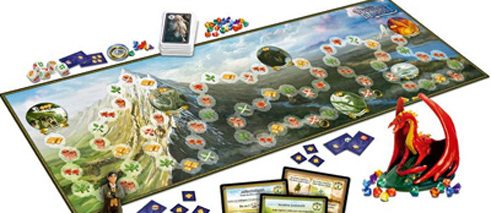Literature in the form of a Board Game
Off the Bookshelf and onto the Games Table

These days more and more board games are to be found on the shelves of bookshops. Game companies have been inspired by various literary works and are now making games for the fans of certain books. This enables the players to become the authors of their own stories.
Up to now any exchange of ideas or cooperation between the realm of literature and the realm of board games has been relatively rare, even though all sorts of parallels are to be observed. Both realms, for example, can be enjoyed in one’s leisure time, they both can take the people involved into imaginary worlds and they both can provide enjoyment and excitement.
Over the past few years game companies have started to embrace the idea of literature in game form and now offer customers literary works in the form of a board game to play at home. Literature was the driving force behind such characters as Phileas Fogg (Around the World in 80 Days), Pater William (The Name of the Rose) or Dracula becoming figures in a board game. For the game version of the fantasy classic The Lord of the Rings the players slip into the role of the Hobbits to fight against Sauron and the destruction of the ring. The all-important question in J. R. R. Tolkien’s book – “Will the community win in the end or the evil power?” – is cleverly adapted to the game by making the players the Hobbit community that fights against the game-driven Sauron.
“The trilogy’s spirit of friendship, community and cooperation are reflected in the board game, too – because the players either win together or they lose together. This game principle based on cooperation combined with the idea of literature is a big hit – with families, too,” says Barbara Schmidts, games editor at the Kosmos-Verlag publishing house in Stuttgart – a company that can look back over many years of tradition. The Pillars of the Earth game, based on the novel of that name by Ken Follett, also transposes the theme of the book to the game medium in a playful way. It is all about a cathedral being built in the fictitious town of “Kingsbridge”. In the course of the game the players encounter the characters and the events from the novel. “They experience a slice of life from the Middle Ages,” Barbara Schmidts says.
Marketing strategies teamed with the fun of playing games
The Lord of the Rings – voted “Game of the Year” and awarded the special prize for “Literature as a Game” by the jury –, and The Pillars of the Earth – awarded the German Games Prize – were both produced by the Kosmos publishing house. It not just have games in its program, but also books. From the publishing house’s point of view adaptations of this kind are the logical follow-up. After all when the buyer already knows the work of literature, he may have a picture of the game in his mind and that is why the games attract a lot more attention. “If his expectations are fulfilled, the customer takes home a fantastic game based on his favourite book, which he can then share with others,” as Barbara Schmidts explains as one of the plus points of literary games. For, “It is simply lots of fun to delve into the characters of your favourite book.” Furthermore a new sales channel is opened up for the book business when literary games are showcased with the books they are based on. In this way new target groups can be addressed – people who are not the typical customers of a toy and games shop.When transposing the content of the book to the game various characteristics of both media have to be taken into consideration, as well as the motives and the expectations of the users. Depending on the game, the plot or the action is more or less closely based on that of the book. The dramatic composition, however, is of a different nature to the book, as a book normally has an open or an ambiguous ending, whereas a game always ends with either a victory or a defeat. The games that are most successful manage to capture the atmosphere of the book and provide an opportunity to break away from the linear narrative of the book – the players have the freedom to re-interpret the story or to enhance or spin out the story, provided they stick to the rules of the game. This leads to the creation of player-generated content, whereby the original novel serves as a kind of meta control system, i.e. a framework that can apply to all the players involved.